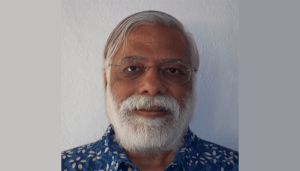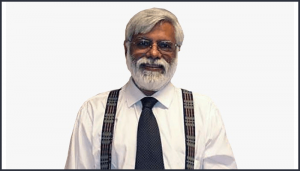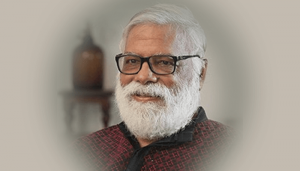A virtual memorial held in honour of the late Prof. Kesav Nori witnessed teachers, students, colleagues and many of his friends logging in from various parts of the world to commemorate the genius “academic in industry”, his achievements and also to share heartwarming stories of the legacy he leaves behind.
There’s perhaps an entire generation of topnotch software programmers, developers and professors in India that owes its raison d’etre to a single person – one who showed how programming is more than just logic and math and how it can also be an art form. One who revealed not just his scientific genius but also his humanity. Prof. Kesav Vithal Nori was an internationally acclaimed computer scientist who is closely associated with the evolution of programming languages and compilers. But perhaps more than just being recognised as a “Guru of Computer Science”, he will fondly be remembered by all those he came in contact with, as a friend and an inspiration.
Software At His Core
Prof. Nori’s educational trajectory led him from IIT Bombay where he obtained his BTech to IIT Kanpur to pursue an MTech. Prof. Rajaraman who was then a professor of Electrical Engineering recalls his early enthusiasm of working with computers. “For his first project, I told him to build a calculator but he wasn’t too happy and asked for a change. I gave him another one on comparing characteristics of computers to benchmark machines – something he readily accepted because he was more interested in software.” Upon completing his Masters, he then moved to the Tata Institute of Fundamental Research (TIFR) to pursue work in the theoretical space of Computer Science. Prof. Srinivasan Ramani, an Internet Hall of Fame inductee, who was Prof. Nori’s colleague likens him to “a local representative of Prof. DaXtra”, a pioneer of structured programming. Little wonder then that when they wanted to publish an Indian edition of Prof. DaXtra’s book, Prof. Nori’s help was enlisted and they managed to get a reproduction for 35 or 40 Rupees a copy. “Kesav was also interested deeply in developmental programming languages. His passion for PASCAL was mainly because it was such a well-structured language and it was academically so meaningful to talk about properties of programming languages”, says Prof. Ramani. While Prof. Nori rose to be a research scientist at TIFR, his first love lay in teaching. In collaboration with Prof. Ramani, he initiated and ran several part-time courses in software technology, which were later conducted under the banner of the Computer Society of India (CSI). This effort expanded to a nation-wide one of conducting exams to test and formally certify working professionals.
At IITK As Faculty
It was in the late ‘60s that IIT Kanpur became the first engineering college in India to establish a Computer Science group offering a Masters and PhD program too. It only seemed logical for the academically inclined Prof. Nori to return to his alma mater in 1978, this time as faculty in the newly set up Department. “Until then the programming language taught to all undergraduates was FORTRAN,” says Prof. Rajaraman who welcomed his former student as a colleague. It was Prof. Nori who began teaching the new language PASCAL. He wrote a PASCAL compiler which he would then go on to use for his labs. His passion for the subject was so intense that it rubbed off on all his students – undergraduates, and Masters students alike. To have been his mentee meant carrying and living his aphorisms lifelong. “He often told us – programs should be generated and not written, and program generators should be generated and not written,” says Neel Sundaresan, a former student and current VP Engineering at Microsoft. Prof. Sanjiva Prasad, IIT Delhi, who confesses that he never even took a course with Prof. Nori remarks that he was such an awe-inspiring legend when he joined IIT Kanpur in 1980. “He enthused so many undergraduates such as my friends to get interested in Computer Science and inspired many others to work on compilers. I wish I had shown more enterprise then for it would have saved me probably 5 years learning time and given me a completely different perspective to the research I ended up doing later – in programming languages and semantics,” he says. After an extremely fruitful three-year-long teaching association at IIT Kanpur, Prof. Nori went to Switzerland to work with Nikolaus Wirth on what is well known as the PASCAL P4 compiler. He also went to Carnegie Mellon University to pursue further research and worked on the Production-Quality Compiler-Compiler Project.

The TRDDC Centre
In 1981, TCS set up its first software research centre called the Tata Research Development and Design Centre (TRDDC) with emphasis on areas of Machine Learning, Software Engineering, Process Engineering and Systems Research. Dr. E.C. Subbarao, an IIT Kanpur faculty who is credited with building the institute’s relationship with industry in various domains was entrusted in setting up the centre. Upon Prof. Subbarao’s insistence, Prof. Nori came to Pune to help with the centre. ‘Everybody in India wanted him then – the IITs wanted him, TIFR wanted him. I’m glad he chose to come to TRDDC,” says Prof. Subbarao, adding that he was probably motivated to do so since he considered software technology not only as an academic pursuit but one that could have a lucrative impact on engineering and technology as a whole. “Considering the mission with which TRDDC was set up – that is to use existing Science for the benefit of our industry and our people – Nori fitted the bill completely,” exclaims Prof. Subbarao.
Creating A Culture
A 20-year inning at TRDDC saw the creation of a culture that was welcoming and inspiring all at once. Gautam Shroff, Head of TCS Innovation Labs in Delhi remarks about how Prof. Nori used to take him along to meet important people in TCS, thus giving him the much-needed credibility coming in the wake of his lateral entry from IIT Delhi. “I didn’t understand then the things he spoke of but he was so forward looking. For instance, we were generating code from models and he would say, why don’t the models generate themselves, why do they need the code? And 10 years later, we built the code platform called Ion which has executable models!” For all the interns who were starting out their career, they couldn’t have asked for a better launching pad than Prof. Nori. “He was my boss, my guide, my mentor – all the things that you need to start your career. Sometimes I feel he pampered us too much; he was such a nice boss,” says Hanumantha Rao Susarla, adding that he pursued a PhD only because Prof. Nori ‘pushed’ him to do it. RD Naik, another former intern and currently Principal Scientist at TRDDC says, “In TRDDC, we owe a lot of things to Prof. Nori – whether it is the meta tools philosophy, tools for building tools philosophy which all started of course with the production quality compiler compiler paradigm but I think the major thinking contribution that he gave to us, was more about how to generalise the solutions, how to conceive of tools that can be used to build other tools. I think we are able to carry some of those thoughts even in our solutions that we try to build today.”
It was his knowledge of compilers that came in handy to analyze all the programs to pinpoint areas where the programs needed change, reducing manpower requirement at the time to correct the Y2K bugs. According to Prof. Rajeev Sangal, a close associate of Prof. Nori, “The technology that he developed was used within TCS to identify and convert the Y2K issues in software.” In addition to this, he is credited with developing a TCS product known as MasterCraft, an artificial intelligence software that can automatically create code from a simple computer language, and rewrite the code based on the user’s needs. It earned him the moniker of ‘MasterCraftsman’ from none less than Mr. F.C. Kohli himself. Prof. Kannan, IIT Bombay speaks of how despite being a chemical engineer and in that sense, “the odd man” at a confluence of computer scientists and engineers, he collaborated with Prof. Nori on a simulator project. “Interacting with him gave me a perspective to the problem hitherto unknown to me. I never would have thought along those directions and I benefited a lot,” he muses. Crediting Prof. Nori with the contributions made to the Foundations of Software Technology and Theoretical Computer Science (FSTTCS), a premier international computer science conference that was established in 1981, Prof. Somenath Biswas, former PhD student and colleague, says, “I think it survived at some point only due to him and the support from the TCS group.”
Not All Work
It’s one thing to be an intellectual guide and quite another to be a confidante and friend. Prof. Nori was both and perhaps more. His easy-going manner and gentle demeanor endeared him to all. “Conversations with Kesav were always a pleasure and quite without realising in easy-going chats on any of a thousand subjects, you ended up learning something very fundamental about science, software, software engineering or more. Plus he always had this twinkle in his eye!,” says Sanjiva Prasad. His trademark jeans coupled with the suspenders, aka “western wear” unlike the staid sartorial style of his other colleagues made him a likely “cool professor” candidate. “He was a coach in the true sense of the word, he never told us explicitly what to do when we got stuck. He would basically take long walks with us, discuss the problem, and encourage us to research for ourselves and figure out the right solution,” reminisces Sanjeev Jorapur who was another intern at TRDDC then. Savita Farooqui agrees when she says with a laugh that he had the knack of making one feel that they were the closest to him and hence privileged to have his attention. Prof. Nori was in possession of a huge collection of Asterix and Tintin comics that he generously lent to his interns. “He had a large collection of liqueurs too – Cointreau and Kahlua and taught us how to drink those liqueurs properly,” smiles Sanjeev Jorapur. A true elder statesman of sorts, his child-like enthusiasm often found him bonding with his staff over a game of table tennis, or cricket, running marathons and even watching movies with them.

If Pesarattu Be The Food Of Love
There’s a quote attributed to Cesar Chavez that befits Prof. Nori: “If you really want to make a friend, go to someone’s house and eat with him…the people who give you their food give you their heart.” He was a die-hard foodie. Cooking and sharing it with his close circle of family, and many who he called friends, was his way of sharing love. Early signs of this were spotted way back in his days at IIT Kanpur where a little booklet would be put outside his quarters just before the arrival of his cook, Mohanlal. Prof. Biswas recollects that anybody who wanted to eat dinner would add their name to it before Mohanlal got down to work. “His house was for all of us. His generosity was almost a saintly kind of quality,” he says. At TRDDC and later at IIITH, all his associates fondly recall long conversations over lunches and dinners they were invited for and not the least, the pesarattus that either he himself or his wife, Lakshmi would make for them.
The Other Facets
While Prof. Nori will primarily be known for his advancements in Computer Science, Prof. Sahasrabuddhe wishes to highlight his expertise in the Japanese art of paper folding – Origami, or what would go down in history to be known as ‘Norigami’. “It is Kesav’s origami that my family and I have continued today,” he says, mentioning that In the ‘90s, his daughter gave origami demos in schools across Pune to get children interested in the art – something his little granddaughter herself has picked up and showcases to her primary school class. Naryana Mandaleeka or MGPL as he’s more popularly known, a long-time associate at TCS, says,”We used to say he has a good way with the Japanese because Nori is a Japanese word too.” Another little-known fact about him is his calligraphy skill. “Those days there were no PPTs but the way he used to prepare slides is amazing…with just two words and an arrow in between,” shares Hanumantha Rao. He had a way with words and was known for his puns, prompting people to label him a ‘pun’dit. “I remember a very enlightening lecture he gave once on compilers during a visit. We were sitting there giggling at the bad jokes that he and HPS exchanged on what were good and bad frontends and backends,” says Sanjiva Prasad.
The IIITH Association
In 2003, when Prof. Nori moved to Hyderabad to start a small R&D Centre focused on Business Systems and Cybernetics, he also joined IIITH as a distinguished professor at the Software Engineering Research Centre. It was at this time that his attention veered towards programming in natural languages. “He began to explore how one can write programs in natural languages accounting for all the imprecisions that exist while maintaining brevity and intent that can be conveyed easily in natural languages as opposed to formal, contemporary programming languages,” explains Prof. Sangal. As someone who had the privilege of sharing an office next door to Prof. Nori, Dr. Venkatesh Choppella says he was able to witness from close quarters how great minds work and how big ideas are formed. “All this while always having his feet on the ground,” he says. An idea that will remain with Dr. Choppella is Prof. Nori’s concept of the ‘responsibility of a programmer’. “It sounded strange, but the idea was that we, as programmers create words for everybody and those words better be good. He wanted to make sure that not only do programs run but that they ought to run correctly, and we should be able to prove that they run correctly,” he says.

Outreach
Prof. Nori is one of the pioneers of TCS’ computer-based adult literacy program that has been hugely successful all over India and South Africa. He was also closely associated with EnhanceEdu, an outreach initiative of IIITH that aimed to enhance the quality of IT education in engineering colleges under the Manpower Development schemes of MeitY. “He really believed in our outreach program because he believed that problems in India have to be solved by Indians and one of the ways to do this is to empower teachers. Then they can empower the students and that would be a sustainable way of doing things,” says Sandhya Kode, the Founder Director of EnhanceEdu. Speaking of his charismatic nature, she says,”He inspired me past the age of 60 to go get a PhD!”. His sense of humour belied a deep philosophical mind – something that Prof. PRK Rao, his professor at IIT Kanpur chooses to bring to the fore. Quoting from the abstract of a paper presented at the Computer Software and Applications Conference in Beijing in 2007: “This paper draws an analogy between the process of requirements determination and Plato’s allegory of the cave. Specifically, it describes requirements problems that arise when our perceptions of reality differ from actual reality,” Prof. PRK Rao says,”The point I’m trying to make is there is a deep philosophical anguish which characterises Nori’s approach to education. The aim of it is something more deep. That I thought has been his own constant striving.”
Tuesdays With Nori
Towards the end of his career, Parkinson’s disease took a toll on Prof. Nori’s health severely affecting his mobility. But that didn’t stop him from visiting the IIITH campus and attending meetings every Tuesday with an infectious enthusiasm. Calling him a ‘Knowledge Warehouse’, Padmalatha Nistala, a PhD student, says that he knew about so many disciplines. “Not only Computer Science but software engineering, education technologies, systems engineering, cybernetics, manufacturing, and process engineering. He has been the motivation and inspiration behind me registering for the PhD. It will always haunt me a bit that when I am so close to submission of my final thesis, he is no more,” she says. Sridhar Chimalkonda, a former PhD student is all praise for his humility. “Despite path-breaking ideas that were way ahead of his time, he would humbly say, I made an attempt or I conducted some experiments. That is possible only for an intellectual genius like him.” Referring to his warm, affable nature, Prof. Raghu Reddy says,”It’s not just a loss for SERC and IIITH but the overall computing community in India”. “Even though he was here in his last part of his career, he was an integral part of the institute, we will miss him greatly. Hopefully the team here will have imbibed some of the ideas from him and can carry that forward,” says Prof. PJ Narayanan, Director of IIITH. Speaking on behalf of all those who had the privilege of encountering Prof. Nori, CK Mohan, who was in the first batch of Computer Science at IIT Kanpur puts it succinctly by saying,”There’s a little bit of Kesav Nori in all of us.”
A recording of the virtual memorial service can be viewed at https://www.youtube.com/watch?v=YYVhtWF8DgI



I took his course on Business Systems Engineering. Perhaps the best elective I took all four years of my undergrad. We could listen to him for hours.
Himanshu says: